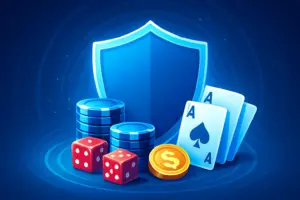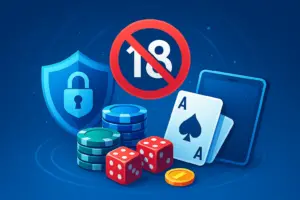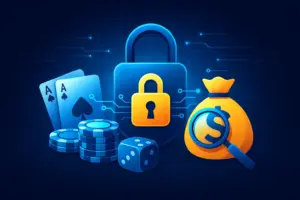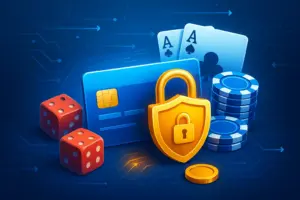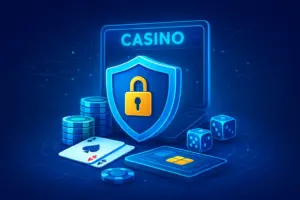Responsible Gambling: Stay Safe, Stay Smart, Stay in Control
At Lucky Casino, we believe that gambling should always be a source of entertainment and fun. Our goal is to provide players with safe, enjoyable experiences while encouraging healthy gaming habits. We are committed to promoting responsible gambling and helping our community stay in control of their play.
Our Commitment to Responsible Gaming
Lucky Casino is passionate about iGaming, but we also understand the importance of protecting players. Responsible gambling is at the heart of what we do. We want to ensure that every session is enjoyable, safe, and never harmful. That’s why we provide guidance, tools, and resources to help players keep their gaming balanced.
Understanding Responsible Gambling
Responsible gambling is about enjoying casino games in moderation. It means treating gaming as a form of entertainment, not a way to earn money. While wins are exciting, gambling should never interfere with your daily responsibilities, finances, or relationships. By setting personal boundaries and knowing your limits, you can make sure gambling stays positive.
Protection of Vulnerable Gamblers
Not every player approaches gambling from the same perspective. While many treat it as a form of casual entertainment, others are more likely to experience negative effects. These individuals are described as vulnerable gamblers. The term refers to players who, due to personal, financial, or psychological circumstances, face a greater risk of developing unhealthy gambling behaviors.
Vulnerability can arise from different factors. Sometimes it is linked to age or mental health, while in other cases it comes from financial instability or social isolation. Unlike recreational players who can set limits and walk away, vulnerable gamblers often struggle to control their behavior once they start. For them, gambling is not just about fun; it can become an escape, a coping mechanism, or even a perceived solution to money problems.
Understanding who these players are and why they need extra protection is crucial. By identifying the groups most at risk, both casinos and regulators can create safeguards that prevent harm before it occurs. At the same time, players themselves can learn to recognize the warning signs and seek help early.
Who Is Considered Vulnerable?
- Individuals with a history of addiction – Players who have struggled with gambling or substance abuse in the past are more prone to relapse.
- Young adults – The lure of fast money, combined with limited life experience and financial discipline, makes this group particularly at risk.
- Elderly players – Isolation, fixed incomes, and declining cognitive abilities can contribute to unhealthy gambling patterns.
- Financially unstable individuals – People facing debt or unemployment may see gambling as a way out, increasing the danger of compulsive play.
- Those with mental health challenges – Anxiety, depression, or stress can fuel gambling as a coping mechanism.
Why Extra Protection Matters
For vulnerable players, gambling-related harm can escalate quickly. What starts as entertainment may lead to mounting debts, strained relationships, or emotional distress. Protecting these individuals is crucial for preserving overall well-being and minimizing financial loss.
Prevention of Underage Gambling
Gambling is strictly for adults, but in today’s digital world, minors have more ways than ever to try and bypass restrictions. From using a parent’s payment card to accessing unlicensed sites or even experimenting with social casino apps, underage players often find loopholes if proper safeguards are not in place. This makes prevention a shared responsibility between regulators, operators, and parents.
Ensuring that children and teenagers are kept away from gambling is essential, not only because it is illegal but also because early exposure can increase the likelihood of developing harmful habits later in life. Licensed operators are required to enforce strict age-verification measures, while parents and guardians can use parental controls and open communication to reinforce safe boundaries. Together, these efforts help maintain gambling as an adult-only activity and protect young people from unnecessary risks.
Why It Matters
- Early exposure increases the chance of future gambling problems.
- Families can face financial loss and emotional stress.
- Unlicensed sites and apps make access easier for minors.
Key Protections
- Strict Age Verification – ID checks, KYC, and biometric tools stop minors from registering.
- Secure Payments – Deposits and withdrawals only allowed from verified cardholders.
- Responsible Marketing – No childlike designs or ads near youth content.
- Parental Controls – Device locks, payment restrictions, and ISP filters block access at home.
What Parents Can Do
- Remove saved cards and auto-fill data from shared devices.
- Use child accounts with spending approvals.
- Talk openly about gambling risks and “easy money” myths.
Safety Measures Against Criminal Activities in Gambling
Online casinos can be targeted by fraudsters and criminal networks looking to exploit payment systems or player accounts. Common risks include money laundering, identity theft, account takeovers, and bonus abuse. These activities not only harm operators but can also put genuine players at risk of losing funds or having their personal information exposed.
To counter these threats, licensed operators must follow strict security and compliance standards. This includes advanced monitoring systems, fraud detection tools, and cooperation with financial authorities. Players also benefit from extra layers of protection such as two-factor authentication and identity checks, which ensure that their accounts cannot be misused.
Key Safety Measures
- Anti-Money Laundering (AML) Controls – Transaction monitoring and suspicious activity reporting.
- Identity Verification (KYC) – Prevents the use of stolen or fake documents.
- Account Security – Multi-factor authentication, device fingerprinting, and fraud alerts.
- Secure Payments – Only regulated and PCI-compliant gateways accepted.
- Operator Oversight – Licensed casinos are audited to detect and block criminal misuse.
Together, these safeguards keep gambling environments safer, ensuring that players can focus on entertainment without worrying about criminal interference.
Information Privacy in Online Casinos
When players gamble online, they share sensitive data such as personal details, payment information, and identification documents. Protecting this data is essential for building trust and preventing misuse. Breaches or careless handling of information can expose players to identity theft, fraud, and long-term financial harm.
Licensed casinos are required to follow strict data protection laws, such as the GDPR in Europe or equivalent national regulations elsewhere. This ensures that operators collect only what is necessary, store it securely, and never share it with unauthorized third parties. Clear privacy policies, encryption protocols, and robust database security all play a part in keeping player information safe.
How Privacy Is Protected
- Data Encryption – All communication and transactions secured with SSL.
- Compliance with Law – Operators must follow GDPR or local privacy standards.
- Controlled Access – Only authorized staff may handle sensitive player records.
- Transparency – Players can review how their data is stored and request deletion.
- No Sharing with Unlicensed Entities – Data is never sold or traded unlawfully.
Tips for Players
- Choose only licensed and regulated casinos.
- Review privacy policies before sharing documents.
- Avoid saving passwords or payment details on shared devices.
- Enable two-factor authentication whenever possible.
- Regularly monitor bank statements for unusual activity.
By combining regulation, technology, and personal vigilance, responsible casinos and players work together to keep information private and secure.
Online Payment Protection at Online Casinos
Deposits and withdrawals are at the heart of every online casino experience, but they also represent one of the biggest risks if not handled securely. Players share sensitive banking details each time they fund an account or request a payout, which makes payment protection vital for both safety and trust. Without strong safeguards, users may face fraud, unauthorized charges, or even theft of their personal information.
Responsible casinos therefore partner only with licensed, PCI-compliant payment providers and apply strict anti-fraud measures to every transaction. From encryption technology to ownership verification, these systems are designed to keep money safe, ensure payouts are reliable, and maintain full transparency. By combining regulation with modern security tools, online casinos can protect player funds while delivering a smooth and trustworthy payment experience.
Core Protections
- Secure Gateways – Payments processed through PCI-compliant systems with advanced fraud detection.
- Encryption – Banking details and transactions encrypted end-to-end with SSL technology.
- Ownership Verification – Deposits and withdrawals only allowed from accounts in the player’s name.
- Fast Withdrawals – Licensed casinos must process payouts promptly, reducing fraud risks.
- Transaction Monitoring – Suspicious activity flagged to prevent account takeovers or money laundering.
Tips for Players
- Use only well-known and trusted payment methods.
- Avoid saving card details on shared or public devices.
- Keep separate cards or e-wallets for gambling transactions.
- Enable transaction alerts with your bank or payment provider.
- Report unusual account activity immediately.
With these protections in place, online casinos create a safer financial environment where players can enjoy the games without worrying about their funds.
Creation of a Secure Online Casino Environment
A secure online casino environment is more than just firewalls and encryption. It’s a combination of technology, regulation, and responsible design that ensures players can enjoy games without fear of fraud, data breaches, or unfair practices. Licensed casinos are required to implement strict technical and operational safeguards, creating a space where safety and entertainment go hand in hand.
Security starts with robust platforms that use SSL encryption, fraud monitoring, and anti-money laundering controls. Regular audits by independent bodies confirm that games are fair and payout systems work as advertised. On top of this, casinos integrate responsible gambling tools. Such as deposit limits and self-exclusion—to give players control over their own habits.
Key Elements of a Secure Casino Environment
- Regulatory Oversight – Licensed and audited by trusted authorities.
- Technical Security – Encryption, firewalls, and intrusion detection systems.
- Fair Play – Games regularly tested by independent labs for random outcomes.
- Responsible Gambling Tools – Limits, reminders, and exclusion options available to all players.
- Continuous Monitoring – Platforms track suspicious activity to prevent fraud or abuse.
Player’s Role in Security
- Always choose licensed, regulated casinos.
- Use strong, unique passwords for gambling accounts.
- Enable two-factor authentication where available.
- Avoid playing on public Wi-Fi without extra protection.
- Regularly review account activity and report anything unusual.
By combining regulatory standards, advanced technology, and player awareness, online casinos create an environment where safety and entertainment thrive side by side.
How to Recognize Problem Gambling
Gambling should always be a fun and exciting activity, but sometimes it can slip into unhealthy territory. Problem gambling often develops slowly, making it easy to miss the early signs. Knowing what to look for can help you or someone close to you take action before it becomes overwhelming.
Financial Warning Signs
Spending more money than you planned, dipping into savings, or borrowing funds to gamble are strong indicators of risk. Hiding expenses or avoiding conversations about money can also point to a growing problem.
Changes in Behavior
Problem gambling can affect daily life in subtle ways. Skipping work or social commitments, becoming secretive about time spent online, or lying about gambling habits are all red flags to watch for.
Emotional Strain
Feelings of guilt, stress, or anxiety after playing can suggest that gambling is no longer a positive experience. Over time, this emotional weight can affect relationships and overall well-being.
Chasing Losses
Trying to win back money after losing often leads to even bigger losses. This cycle of chasing losses is one of the most common and dangerous signs of problem gambling.
Social Isolation
When gambling takes priority, friends, family, and hobbies can fall to the side. Withdrawing from social life is a signal that gambling may be taking up too much space.
Recognizing these signs early makes it easier to regain control. If any of these points feel familiar, it may be time to set stricter limits, take a break, or reach out for professional support.
Tips for Safer Play
Set a Budget Before You Start
Decide how much money you are comfortable spending before playing. Once that amount is gone, stop. Setting a clear limit keeps gambling fun and prevents overspending.
Take Regular Breaks
It’s easy to lose track of time when you’re caught up in the excitement of a game. Step away from the screen, grab a drink, or go for a short walk. Breaks help you stay refreshed and in control.
Never Chase Losses
Trying to win back money after a losing streak often leads to even greater losses. Accept that losing is part of gambling, and don’t risk more than you planned.
Avoid Gambling Under Stress or Influence
Strong emotions, alcohol, or fatigue can impair your judgment. Only play when you’re calm, clear-headed, and able to make rational decisions.
Balance Gambling with Other Activities
Make gambling just one of many hobbies. Spend time with family, exercise, or enjoy other forms of entertainment. A balanced lifestyle helps ensure gambling stays a fun pastime rather than a problem.
Tools to Stay in Control
Most licensed casinos offer tools designed to help players manage their activity. We encourage you to make use of these features:
- Deposit Limits – Set daily, weekly, or monthly limits to control spending.
- Time Limits – Restrict the length of gaming sessions to avoid long play.
- Self-Exclusion – Temporarily or permanently block access to your account if you need a break.
- Reality Checks – Receive reminders of how long you’ve been playing.
These tools are there to keep your experience safe and enjoyable.
Support and Resources
Even with the best intentions, some players may find it difficult to keep gambling under control. Thankfully, there are many trusted organizations that provide help, guidance, and confidential support. Below are some of the most reliable resources available worldwide.
GamCare
GamCare is one of the UK’s leading providers of information, advice, and free support for anyone affected by problem gambling. They offer a 24/7 helpline, live chat, and a wide range of counseling services.
Gambling Therapy
Gambling Therapy is an international service providing online support for people struggling with gambling issues. Their multilingual platform offers live chat, forums, and self-help tools for players across the globe.
Gamblers Anonymous
Gamblers Anonymous is a worldwide fellowship that brings together individuals who want to overcome problem gambling. Following a 12-step program, they provide peer support groups where members can share experiences and stay accountable.
BeGambleAware
BeGambleAware focuses on raising awareness of responsible gambling and helping players find treatment if needed. Their website includes practical advice, risk assessment tools, and connections to professional services in the UK.
National Helplines
In addition to global organizations, many countries have national gambling helplines available 24/7. If you’re unsure where to start, searching for your local responsible gambling helpline will connect you with immediate assistance.
A Few Final Words From Lucky Casino
At Lucky Casino, we want every player to enjoy gaming in a safe and responsible way. Gambling should always be fun, never a problem. If you ever feel your gaming habits are becoming difficult to manage, don’t hesitate to use the tools available or seek professional support.
Play smart. Play safe. Enjoy responsibly.
Frequently Asked Questions
What is responsible gambling?
Responsible gambling means playing casino games for entertainment while staying in control of time and money. It’s about setting limits, making informed choices, and ensuring gambling never causes harm to your finances or lifestyle.
How can I tell if I have a gambling problem?
Warning signs include spending more than you can afford, chasing losses, hiding your gambling from others, or feeling anxious when you can’t play. If these sound familiar, it may be time to seek help or take a break.
What tools are available to help me gamble safely?
Licensed casinos offer tools such as deposit limits, time-out sessions, self-exclusion programs, and reality checks. These features help players set boundaries and maintain healthy habits.
Can minors access online casinos?
No, online gambling is strictly for adults aged 18 or older. Casinos use identity verification to block underage players, and parents can use software like NetNanny or Qustodio to restrict access at home.
Is my personal and financial information safe at online casinos?
Trusted casinos use encryption, firewalls, and secure payment systems to protect your data. Always choose licensed and reputable platforms to ensure your privacy and transactions are safeguarded.
Where can I get help if I’m struggling with gambling?
Support is available through organizations like GamCare, Gambling Therapy, Gamblers Anonymous, and BeGambleAware. These services provide confidential advice, counseling, and community support.

The Author



The Author
Content Expert










